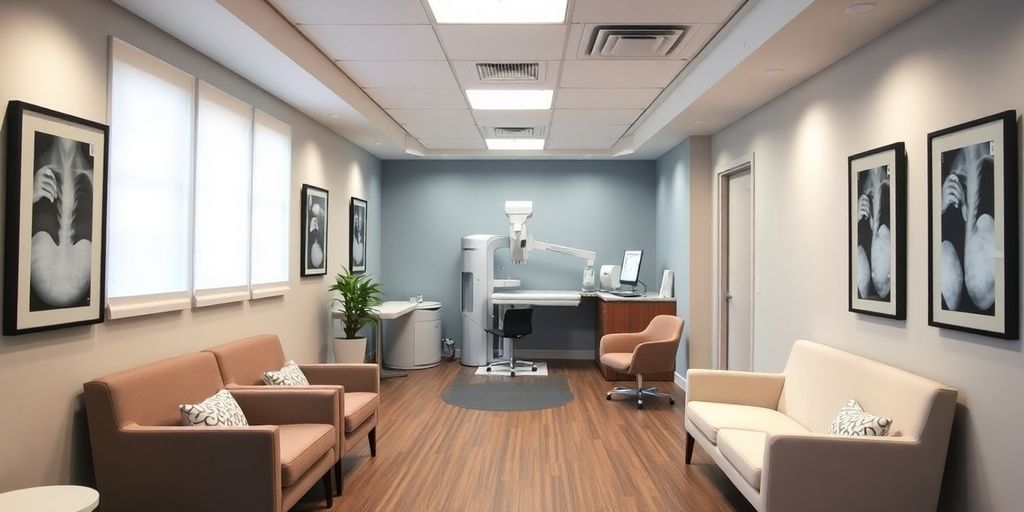Getting a mammogram is a crucial step in maintaining your health, especially for women over 40 or those with risk factors for breast cancer. This guide will help you understand the importance of mammograms, how to find a local screening center, and what to expect during your appointment. It also covers financial assistance options and resources for support, ensuring you have all the information you need to take this important step in your health journey.
- Discover the Best Clubs Near Me Open Now for an Unforgettable Night Out
- What Pharmacy Has Wegovy In Stock Near Me? Your Comprehensive Guide to Finding Availability
- Discover the Perfect Cafe for Couples Near Me: Top Romantic Spots to Enjoy Together
- Discover Exquisite Fine Dining Near Me: A Culinary Journey Awaits
- Discover the Ultimate Guide: Where to Get a Brazilian Wax Near Me
Key Takeaways
- Mammograms are vital for early detection of breast cancer, especially for women over 40.
- You can find mammogram centers through online resources, local hospitals, or mobile units.
- Financial help is available for mammograms, including insurance coverage and low-cost programs.
- Prepare for your appointment by knowing what to expect and asking the right questions.
- If you get abnormal results, there are next steps and support resources available.
Understanding the Importance of Mammograms
Why Regular Mammograms Matter
Mammograms are crucial for early detection of breast cancer. Having mammograms regularly can lower the risk of dying from breast cancer. They help find cancer before symptoms appear, making treatment more effective.
You are viewing: Discover Where to Get a Mammogram Near Me: Your Guide to Local Screening Centers
Who Should Get a Mammogram
Most women should start getting mammograms at age 40. However, those with a family history of breast cancer or other risk factors may need to start earlier. Here are some key points:
- Women aged 40 and older should have annual screenings.
- Those with a family history should consult their doctor about starting earlier.
- Women under 40 may need a mammogram if they have symptoms or risk factors.
The Difference Between Screening and Diagnostic Mammograms
Understanding the types of mammograms is important:
- Screening Mammograms: For women with no symptoms, done annually.
- Diagnostic Mammograms: For women with symptoms or abnormal findings from a screening.
| Type of Mammogram | Purpose | Recommended Age |
|---|---|---|
| Screening Mammogram | Routine check for women without symptoms | 40 and older |
| Diagnostic Mammogram | Further evaluation of symptoms or concerns | As needed |


Regular mammograms are a key part of staying healthy and can save lives by catching issues early.
How to Find a Mammogram Center Near You
Finding a mammogram center nearby is essential for your health. Here are some effective ways to locate one:
Using Online Directories
- Search online for local mammogram centers using health websites.
- Check state health department resources for listings.
- Use insurance provider directories to find covered facilities.
Contacting Local Hospitals and Clinics
- Call nearby hospitals to ask about their mammogram services.
- Inquire if they have financial assistance programs available.
- Ask about referrals to other facilities if they don’t offer mammograms.
Mobile Mammography Units
- Look for mobile mammography units that travel to different locations.
- These units often provide services at community events or workplaces.
- Check local health organizations for schedules and locations.
Remember: Regular mammograms are crucial for early detection of breast cancer. Don’t hesitate to reach out for help in finding a center.
By using these methods, you can easily find a mammogram center that meets your needs. Whether it’s a hospital, clinic, or a mobile unit, there are options available to ensure you get the screening you need. For example, Northwestern Medicine Diagnostic Imaging Breast Health in Orland Park offers various services, including mammography, to help you stay healthy.
Cost and Financial Assistance for Mammograms
Insurance Coverage for Mammograms
Most health insurance plans cover screening mammograms for women over 40. The Affordable Care Act mandates that these screenings are fully covered every one to two years. If you have Medicare or Medicaid, they also cover these costs. However, if you don’t have insurance, you can still find options for affordable care.
Low-Cost and Free Mammogram Programs
Read More : Discovering Delight: Top Fish Restaurants Near Me for a Fresh Seafood Experience
If you’re looking to find a low-cost or free mammogram near you, several organizations can help:
- National Breast and Cervical Cancer Early Detection Program: Offers services for low-income and uninsured women.
- Susan G. Komen Foundation: Provides access to free or reduced-cost mammograms.
- Local charities and hospitals: Many have programs to assist those in need.
Payment Plans and Financial Counseling
If you need help covering costs, consider these options:
- Sliding-fee scale: Discounts based on income.
- Cash pay discount: Negotiate a lower price if you pay upfront.
- Payment plans: Spread the cost over several months.
Many women may feel overwhelmed by costs, but there are resources available to help you access necessary screenings.
By exploring these options, you can ensure that financial barriers do not prevent you from getting the care you need.
Preparing for Your Mammogram Appointment
What to Expect During the Appointment
When you arrive for your mammogram, you will check in at the front desk. The process is quick and straightforward. You will be taken to a private room where a technician will explain the procedure. You will need to undress from the waist up and wear a gown. The technician will position your breasts for the X-ray, and you may feel some pressure, but it should not be painful.
How to Prepare Before the Day
To make your appointment go smoothly, consider these tips:
- Schedule the test for a time when your breasts are least likely to be tender, usually after your period.
- Avoid using deodorants, lotions, or powders on the day of the exam, as they can interfere with the images.
- Bring any previous mammogram results if you have them, as they can help the technician compare your current images.
Questions to Ask Your Healthcare Provider
Before your appointment, it’s a good idea to ask your healthcare provider some questions:
- What type of mammogram will I be having?
- How should I prepare for the appointment?
- Will I need a follow-up appointment based on my results?
Preparing for your mammogram can help ease any anxiety. Knowing what to expect and how to prepare can make the experience more comfortable.
Overcoming Barriers to Getting a Mammogram
Many women face challenges when trying to schedule a mammogram. Understanding these barriers can help you find solutions. Here are some common issues and ways to overcome them:
Scheduling Challenges and Solutions
- Long Wait Times: If the soonest appointment is too far away, ask if there are other facilities nearby that can see you sooner.
- Doctor’s Referral Needed: If you’re under 40 or have specific health concerns, you might need a referral. Check with your doctor to see if they can help you get one quickly.
- Cost Concerns: If the facility quotes a high price, ask if they have partnerships with other places that offer free or discounted mammograms.
Transportation Assistance
- Many facilities offer transportation programs to help you get to your appointment. Don’t hesitate to ask if they can provide a ride or help you find one.
- Some organizations also provide free rides to women in need, ensuring that transportation is not a barrier to care.
Language and Cultural Barriers
- If language is a concern, ask if the facility has staff who can speak your language or if they provide translation services.
- Cultural sensitivity is important; don’t hesitate to express your needs to ensure you feel comfortable during your visit.
Remember, there are resources available to help you navigate these challenges. Don’t let barriers stop you from getting the care you need!
Additional Resources and Support
National Breast Cancer Organizations
There are many organizations dedicated to helping those affected by breast cancer. These groups provide vital support and information. Here are some key organizations:
- American Cancer Society: Offers a 24/7 helpline and various support programs.
- National Breast Cancer Foundation: Provides free resources and educational materials.
- Susan G. Komen Foundation: Focuses on funding research and providing community support.
Local Community Support Groups
Finding local support can make a big difference. Here are ways to connect:
- Check with local hospitals for support groups.
- Visit community centers for information on local meetings.
- Ask your healthcare provider for recommendations.
Online Breast Cancer Communities
Read More : Discover the Best Brewery Near Me: A Guide to Local Craft Brews
Online platforms can offer support and information. Consider joining:
- Breast Cancer Forums: Share experiences and advice.
- Social Media Groups: Connect with others facing similar challenges.
- Webinars and Online Workshops: Learn from experts and ask questions.
Connecting with others can provide comfort and understanding during tough times.
Summary of Resources
| Resource Type | Description |
|---|---|
| National Organizations | Support and educational resources |
| Local Support Groups | Community-based support and connection |
| Online Communities | Virtual support and information sharing |
What to Do If You Receive Abnormal Results
Receiving abnormal results from a mammogram can be alarming, but it’s important to remember that most irregular findings turn out to be nothing serious. Here’s how to navigate this situation:
Understanding Your Results
- Stay Calm: It’s natural to feel anxious, but try to stay calm. Most abnormalities are not cancerous.
- Ask Questions: Don’t hesitate to ask your doctor for clarification on your results. Understanding what they mean is crucial.
- Get a Second Opinion: If you’re unsure about the results, consider seeking a second opinion from another healthcare provider.
Next Steps After an Abnormal Mammogram
- Schedule Follow-Up Tests: Your doctor may recommend additional tests, such as an ultrasound or a biopsy, to get more information.
- Keep Records: Make sure to keep a copy of your mammogram results and any follow-up tests for your records.
- Discuss Treatment Options: If further testing indicates a problem, discuss treatment options with your healthcare provider.
Support and Resources for Further Testing
- Talk to Family and Friends: Sharing your feelings with loved ones can provide emotional support.
- Join Support Groups: Consider joining a support group for women who have faced similar situations.
- Seek Professional Help: If you’re feeling overwhelmed, talking to a mental health professional can be beneficial.
Remember, the good news is that most irregular findings turn out to be nothing, and additional testing is often a precautionary measure. Stay informed and proactive about your health!
Final Thoughts on Finding a Mammogram Near You
Getting a mammogram is a key step in taking care of your health, especially if you’re over 40 or have risk factors for breast cancer. Don’t let worries about cost stop you from getting this important test. There are many places that offer free or low-cost mammograms. You can check with local hospitals, community health centers, and even mobile units that come to your area. If you need help, don’t hesitate to ask your doctor or a social worker for guidance. Remember, taking action now can make a big difference in your health later.
Frequently Asked Questions
What is a mammogram?
A mammogram is an X-ray of the breast used to check for signs of breast cancer.
How often should I get a mammogram?
Women aged 40 and older should get a mammogram every one to two years.
Do I need a doctor’s referral for a mammogram?
If you are 40 or older and have no symptoms, you usually do not need a referral.
What if I can’t afford a mammogram?
There are programs that offer free or low-cost mammograms for those who qualify.
Are mammograms painful?
Some women may feel discomfort during a mammogram, but it usually lasts a short time.
What should I do if my mammogram results are abnormal?
If your results are abnormal, your doctor will discuss the next steps and any additional tests needed.
Soure: https://herego.net
Category: near me


